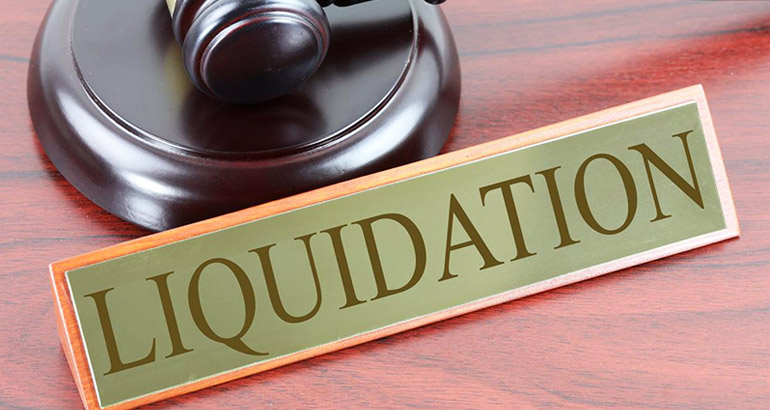Examine This Report on Company Liquidation
Wiki Article
Company Liquidation Fundamentals Explained
Table of ContentsAn Unbiased View of Company LiquidationThe Best Strategy To Use For Company LiquidationThe Only Guide for Company LiquidationGet This Report about Company LiquidationCompany Liquidation - The Facts
A liquidator is particularly assigned to look after the ending up of a firm's events in order for it to be folded usually when the business is going insolvent. The liquidator is a neutral 3rd party that looks after the sale of firm properties in order to repay any kind of arrearages.Their function consists of, however is not restricted to: Neutral Movie director: A liquidator is tasked with serving as an objective 3rd party to oversee the whole company liquidation process. Produce Declaration of Matters: Liquidators should develop a thorough statement of affairs document. This record is distributed to creditors, outlining the existing monetary standing of business at the time of its liquidation.
After the liquidation of a firm, its presence is erased from Business Home and it stops to be a lawful entity. If directors navigated the process without concern, there would be no charges or personal responsibility for firm debts expected. Now, with a clean slate, supervisors can check out new business chances, though professional examination is suggested.
What Does Company Liquidation Mean?
If even more than 90% of all firm shareholders agree, liquidation can take area on brief notice within seven days, the minimal legal notification for creditors. Typically, the bigger the liquidation and the more possessions and resources the organization has, the longer the procedure will certainly take. 'Do I need to pay to liquidate my company?', the answer will depend upon whether or not your service has any type of properties remaining when selling off.
We recognize that no 2 firms are the very same, which is why we will certainly put in the time to be familiar with your organization so we can advise the very best training course of activity for you. We just operate in your benefits, so you can be completely positive in the service we provide.
The Only Guide to Company Liquidation
In the UK, there is an established process to folding or restructuring a minimal firm, whether it is solvent or insolvent. This process is called liquidation and can just be managed by a qualified bankruptcy professional (IP) according to the Insolvency Act 1986. There are 4 major types of firm liquidation process: Financial institutions' Voluntary Liquidation (CVL); Required liquidation; Administration; and Participants' Voluntary Liquidation (MVL).
In these scenarios, it is essential that the company discontinues trading; if the service remains to trade, the supervisors might be held personally accountable and it might result in the bankruptcy professional reporting wrongful trading, referred to as misfeasance, which might result in lawsuit. The directors appoint a bankruptcy specialist and as soon as this has been agreed and verified, there is a meeting with the shareholders.
Obviously, if there are no investors, this action of the process is not required (Company Liquidation). The IP takes control of the firm and begins the company liquidation process. The directors are no more entailed in what happens, including the sale of the business's assets. If the directors want any of the possessions, they can inform the IP.
Company Liquidation Fundamentals Explained
The main distinction is that the firm's lenders put on the court for an ending up order which requires the financially troubled company right into a liquidation procedure. For the most part, creditors take this activity as a last resource since they haven't obtained settlement with other you could try this out kinds of settlement. The court designates an insolvency practitioner, likewise called a main receiver, to try this web-site carry out the obligatory company liquidation process.This sort of business liquidation is not voluntary and supervisors' conduct is reported to the UK's Secretary of State once the liquidation process has been finished. As a result, any director that fails to accept the IP or has been associated with director misconduct, or a fraudulent act, might lead to serious repercussions (Company Liquidation).
It is used as a method to protect the business from any kind of lawsuit by its financial institutions. The directors of the business consent to make regular repayments to resolve their financial debts over a time period. The selected manager handles the voluntary management procedure, and obtains the payments which they then disperse to financial institutions according to the agreed amounts.
Company Liquidation Things To Know Before You Buy
This gives the company with time to develop a plan going forward to rescue the firm and stay clear of liquidation. At this point, supervisors hand control of the business over to the selected administrator. If a company is solvent yet the supervisors and investors wish to close business, navigate to these guys a Participants Volunteer Liquidation is the right choice.The company liquidation procedure is taken care of by a liquidator selected by the directors and shareholders of the firm and they need to sign a declaration that there are no financial institutions continuing to be. The liquidation process for an MVL is similar to that of a CVL because possessions are realised yet the earnings are distributed to the directors and the investors of the business after the liquidator's fees have been paid.
Report this wiki page